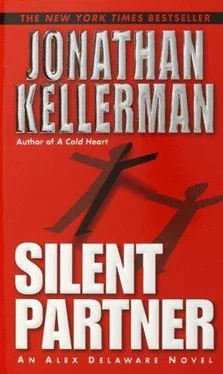Jonathan Kellerman - Silent Partner
Здесь есть возможность читать онлайн «Jonathan Kellerman - Silent Partner» весь текст электронной книги совершенно бесплатно (целиком полную версию без сокращений). В некоторых случаях можно слушать аудио, скачать через торрент в формате fb2 и присутствует краткое содержание. Жанр: Триллер, на английском языке. Описание произведения, (предисловие) а так же отзывы посетителей доступны на портале библиотеки ЛибКат.
- Название:Silent Partner
- Автор:
- Жанр:
- Год:неизвестен
- ISBN:нет данных
- Рейтинг книги:5 / 5. Голосов: 1
-
Избранное:Добавить в избранное
- Отзывы:
-
Ваша оценка:
- 100
- 1
- 2
- 3
- 4
- 5
Silent Partner: краткое содержание, описание и аннотация
Предлагаем к чтению аннотацию, описание, краткое содержание или предисловие (зависит от того, что написал сам автор книги «Silent Partner»). Если вы не нашли необходимую информацию о книге — напишите в комментариях, мы постараемся отыскать её.
Silent Partner — читать онлайн бесплатно полную книгу (весь текст) целиком
Ниже представлен текст книги, разбитый по страницам. Система сохранения места последней прочитанной страницы, позволяет с удобством читать онлайн бесплатно книгу «Silent Partner», без необходимости каждый раз заново искать на чём Вы остановились. Поставьте закладку, и сможете в любой момент перейти на страницу, на которой закончили чтение.
Интервал:
Закладка:
The press wondered what Belding’s new “phase” would be. But there was none, and when it became clear that the disappearing act was permanent, coverage grew progressively sketchier until, by the mid-sixties, neither Belding nor Magna was mentioned other than in financial and technical journals.
The sixties: Oswald. Ruby. Hoffman and Rubin. Stokely and Rap. No shortage of actors willing to strip for the camera. No one cared about a rich hermit who’d once made bad movies.
In 1969, Leland Belding’s death was reported “somewhere in California, following a prolonged illness.” In accordance with the bachelor billionaire’s will, a group of former Magna executives assumed leadership of Magna, with the chairman of the board position going to William Houck Vidal.
And that was it. Until 1972, when a former reporter and hack ghostwriter named Seaman Cross produced a book claiming to be the unauthorized biography of Leland Belding. According to Cross, the billionaire had faked his death in order to achieve “true peace.” Now, having meditated in solitude for seventeen years, he’d decided he had something to say to the world and had chosen Cross as his Pepys, granting hundreds of hours of interviews for a proposed book before abruptly changing his mind and calling off the project.
Cross went ahead and completed the book anyway, titling it The Basket-Case Billionaire and obtaining a “strong six-figure advance.” During its very brief life, it had caused a furor.
Not my kind of stuff. I hadn’t paid much attention to it at the time. But I ate it up now, didn’t put it down until I finished.
Cross’s thesis was that a personal tragedy during the early fifties- a tragedy Belding refused to discuss but which Cross guessed was romantic- had plunged the young billionaire into a manic playboy phase, followed by serious mental collapse and several years of convalescence in a private mental hospital. The man who emerged was “a phobic, paranoid, self-obsessed devotee of a bizarre personal philosophy combining Eastern religion, militant vegetarianism, and Ayn Randish individualism taken to the extreme.”
Cross claimed numerous visits to Belding’s home, a hermetically sealed geodesic dome, somewhere out in the desert, which the billionaire never left. The mode of transport was dramatic: Cross was driven, always blindfolded, always in the middle of the night, to a heliport less than an hour out of L.A.- the implication was El Segundo- then flown to the dome for about two hours and whisked home before dawn.
The dome was described as equipped with a computerized communications panel by which Belding could monitor his international business interests, regulate air and water purification systems (developed by the Magna Corporation for NASA), automatic vacuuming and ambient chemical disinfection, and a convoluted network of pipes, valves, tubes, and chutes through which mail, messages, sterile food and drink entered and waste material exited.
No one but Belding was allowed inside the dome; no photos or sketches were permitted. Cross had been forced to conduct his interviews from a booth on wheels, positioned so that it abutted a speaker panel on the dome.
“We communicated,” he wrote, “by a two-way microphone system that Belding controlled. When he wanted me to see him, he afforded me a view through a clear plastic window- a panel that he could blacken with the touch of a button. He used this blackout panel, not infrequently, to punish me for asking the wrong question. He would withhold his attention until I apologized and promised to be good.”
Bizarre as that was, the strangest part of the story was Cross’s description of Belding:
Emaciated to near-Auschwitzian dimensions, full-bearded, with long, matted gray hair reaching halfway down his back, tangles of crystal necklaces hanging from his wattled neck, and huge crystal rings on every finger. The nails of those fingers were polished a glossy black, sharpened into points, and appeared nearly two inches long. The color of his skin was an eerie greenish-white. His eyes, behind thick rose-tinted lenses, bulged exophthalmically and never ceased to move, darting from side to side and blinking like those of a toad hunting flies.
But it was his voice that I found most unsettling- flat, mechanical, completely stripped of emotion. A voice devoid of humanity. Even now I shiver when I think of it.
Cross’s posture throughout the book was one of morbid fascination. He couldn’t conceal his antipathy toward the billionaire, but neither could he tear himself away.
At regular intervals [he wrote] Belding would interrupt our sessions to nibble on raw vegetables, drink copious amounts of sterilized water, then squat to urinate and defecate, in full view of this writer, into a brass pot that he kept atop an altarlike platform. Once the pot had sat on the altar for precisely fifteen minutes, he’d remove it and expel it through an evacuation chute. During the process of excretion, a self-satisfied, near-religious expression would settle upon his gaunt, raptorish features, and though he refused to discuss this ritual, my reflexive impression was: self-worship, the logical culmination of a lifetime of unbridled narcissism and power.
The latter half of the book was fairly dull stuff: Cross pontificating about the weakness of a society that could create a monster like Belding, transcripts of Belding’s ramblings on the meaning of life- a barely intelligible amalgam of Hinduism, nihilism, quantum physics, and social Darwinism, including indictments of the “mental and moral dwarfs who deify weakness.”
The biography ended with a final burst of editorializing:
Leland Belding represents everything wrong with the capitalist system. He is the grotesque result of the concentration of too much wealth and too much power in the hands of one eminently fallible and twisted man. He is the emperor of self-indulgence, a fanatical misanthrope who views other life forms as nothing more than potential sources of bacterial and viral infection. He is preoccupied with his own body on a corpuscular level and would like nothing more than to live out his days on a planet denuded of all animal and plant life, other than those organisms required to sustain what remains of the wretched life of one Leland Belding.
The Basket-Case Billionaire had been a well-kept publishing industry secret, catching even the Magna Corporation by surprise, garnering massive post-publication attention, and shooting immediately to the top of the nonfiction best-seller list. A record paperback sale was made. Magna lost no time in suing Cross and his publishers, claiming the book was a hoax and libelous, producing medical and legal documents proving Leland Belding had indeed died, years before Cross claimed to have spoken with him. Reporters were taken to a gravesite at company headquarters; a body was exhumed and verified as Belding’s. Cross’s publisher got nervous and asked the writer to produce his data.
Cross reassured them and held a defiant news conference, his editor at his side, in front of a public storage vault in Long Beach, California, where he’d stashed thirty cartons of notes, many of them supposedly signed and dated by Leland Belding. Cameras whirring, he unlocked the vault, opened box after box, only to find each stuffed with notes unrelated to Belding. Frantic, he continued searching, produced old college essays, tax returns, stacks of bound newspapers, shopping lists- the detritus of a life soon to be ruined.
Not a word on Belding. Cross’s horror was captured in close-up as he shrieked conspiracy. But when a police investigation concluded that no one but the writer had entered the vault, and his editor admitted she’d never actually seen the alleged notes, Cross’s credibility vanished.
Читать дальшеИнтервал:
Закладка:
Похожие книги на «Silent Partner»
Представляем Вашему вниманию похожие книги на «Silent Partner» списком для выбора. Мы отобрали схожую по названию и смыслу литературу в надежде предоставить читателям больше вариантов отыскать новые, интересные, ещё непрочитанные произведения.
Обсуждение, отзывы о книге «Silent Partner» и просто собственные мнения читателей. Оставьте ваши комментарии, напишите, что Вы думаете о произведении, его смысле или главных героях. Укажите что конкретно понравилось, а что нет, и почему Вы так считаете.












